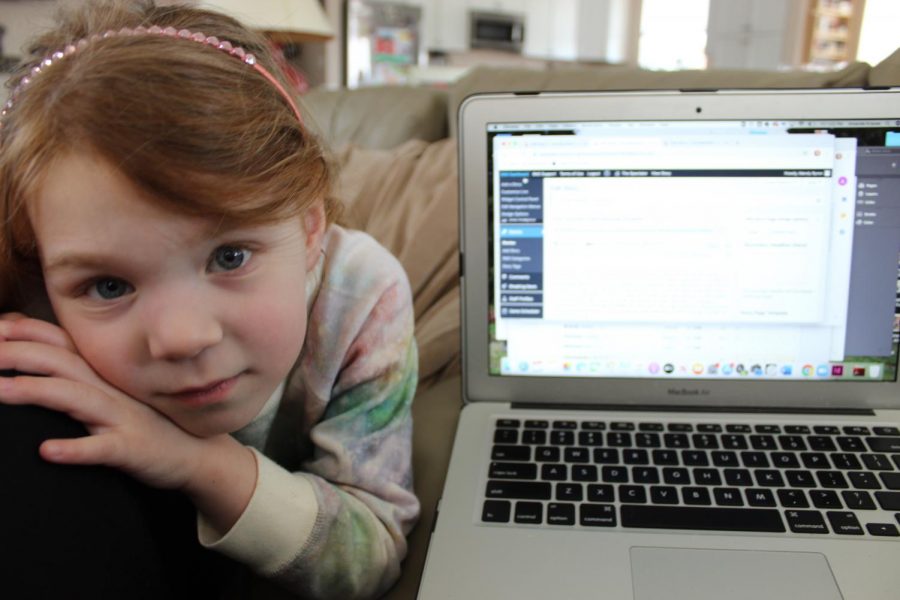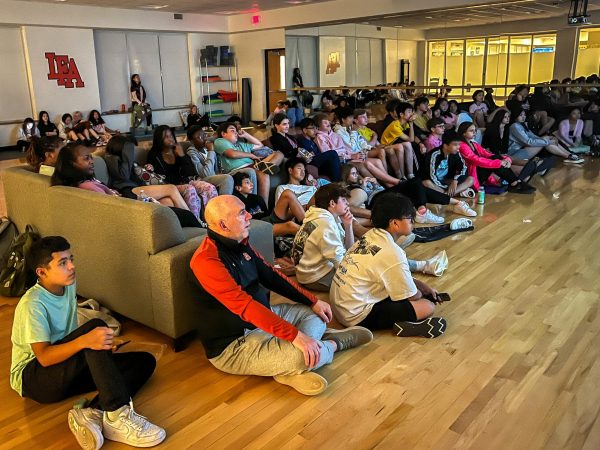E-learning through the eyes of teachers…and not being in the classroom
Photo by Mandy Krause
Journalism and English teacher Mandy Krause attempts to teach her classes while her three year-old, Rory, who would normally be in preschool everyday, hangs on her for attention. Now that schools are closed, this is the dilema of many families with parents who normally work full-time, especially with children too young to have their own e-learning to work on.
May 5, 2020
E-Learning is a new experience for everyone at Lake Forest Academy. While students may be familiar with their peers’ opinions on Zoom, Canvas, and Google Drive, they are not privy to teachers’ thoughts on e-learning. To detail teachers’ feelings about this new, school-wide experience, an anonymous free-response survey was sent out to them.
The first question on the survey asked how they initially responded upon hearing that LFA would go online for the rest of the semester. One teacher wrote, “I was sad not to be able to see my students and colleagues face-to-face each day. LFA is such a wonderful place to spend my days. There is so much happiness and enthusiasm on the campus. But being able to learn remotely would provide an opportunity to interact with my students and advisees.”
This disappointed sentiment was echoed by a majority of those who responded to the survey, as well as a lack of uncertainty for the future of e-learning. A few responses said that they were ready for the new challenges of e-learning, but overall, the teachers’ responses mirrored that of the general student opinion.
When asked about their general thoughts on the e-learning process, many responses said that while not ideal, e-learning was going better than expected. Almost every teacher who responded expressed that they would prefer to have traditional classes, but they understand that the circumstances have dictated that they do otherwise.
“I think we are doing the best that we can given the reality and complexity of the time period. I am thankful that we have the resources that we do to allow for a variety of activities and assignments, and I am so glad that we are focused on learning through the end of the semester rather than throwing up our hands and saying we can’t do anything,” said one teacher.
Another teacher remarked, “I do not think that it replaces face-to-face learning, but there is a lot we can accomplish this way. It’s a different type of learning and interacting. I think its effectiveness can vary from class to class, but there are a lot of great tools available to facilitate students’ progress in these last several weeks.”
One teacher expressed that e-learning allows students to learn at their own pace, which could be beneficial: “Content can still be covered well, and at times perhaps even better as students can rewatch lessons and classes, they are not busy running from class to class, and less social distractions in person. However, educationally as a whole, it is lacking what really makes for a good educational experience, which is content and connection, relationships and ideas.”
Another pro of e-learning, according to a teacher, is the creativity and mental haven it provides. “We are learning that content can be taught in many forms. It teaches us to be creative and to try new approaches that we might not try otherwise. It allows me the chance to see everyone – though not in person- and to take comfort in knowing that my students are eager to learn and are safe. And though it is stressful for me to try to pull together assignments that will work from a distance, it keeps me busy and keeps my mind active.”
The increased comfort of teaching and learning from home has been a big benefit. Two teachers jokingly wrote,“Every day is a jeans day,” and, “I can wear sweatpants all day.” At-home learning and a lack of extracurriculars also allows students to get more sleep, one teacher noted.
Teachers acknowledged that e-learning is not without its drawbacks. Most teachers cited excessive screen-time, extra preparation for classes, time zone differences, difficulty giving assessments, and a lack of connection and community as their main issues with the medium.
“It’s a lot more prep work for me compared to walking into a classroom and starting to talk about the cool stuff I teach. It’s harder to get a summative assessment of how well the students understood the material. Students and teachers do not have as many opportunities to build connections and interact with one another. The different time zones make it difficult for all of our students to have the same experience,” one teacher wrote.
Another response emphasized the lack of community, saying “Well, the obvious one is that there is no real sense of community with e-learning. We lose our classroom dynamic completely, and it is hard for me to gauge how my students are doing.”
Teachers have anticipated that the lack of routine and separation of education and leisure may adversely affect students. “When a student does not wake up on a traditional routine, get dressed in our dress code and physically attend classes, the mental health and perspective can be compromised. Their enthusiasm because of the situation diminishes, and it perhaps doesn’t feel like school. The separation of home and school is important to many students.”
Another major fear is students checking out and not putting forth quality work, which hurts their ability to learn effectively. One teacher responded, “I worry that they may not be retaining the material –that students are rushing to get through work rather than actually stopping to think and process.”
A lack of engagement seems to be an issue for some classes as well: “Some are not completely engaged, and the teacher can’t necessarily catch that. I don’t think it will be as good, but it is close, and students should be able to learn effectively in most classes. I think it depends on the teacher and the class too of course.”
One teacher said that e-learning could be positive or negative, depending upon the student. “For some it is helping–more time to absorb material and rewatch lessons. Others learn no matter what, and they are handling this just as they would handle anything else, by putting their head down and working through it. For others, it is having a negative effect as they cannot stay organized, they are becoming distracted and unmotivated, and they can even more easily hide and stay isolated.”
A different teacher reiterated that students have to take control of the situation to succeed, saying “I think it can be very effective, but it seems to me that the students have more responsibility than ever to advocate for themselves when they need support. We are still here, but it may not be as easy for us to see when students need help if they don’t explicitly ask for it.”
The new grading policy, where students’ grades can not drop below that of which it was on March 13th unless the work submitted during the e-learning period was inadequate or incomplete, was generally supported by the teachers surveyed. Some teachers who said they disliked the policy claimed that students would not produce quality work or learn because their current grades are generally secure.
A teacher in support of the policy said, “I support this policy for the situation we are in right now. Firstly, we are all still learning how to do e-learning together. Furthermore, our entire planet is living through an acute crisis. We all likely have some combination of tangible and intangible concerns that may affect us in a variety of ways. This policy accounts for both of these factors and protects students. Students still need to turn in quality work, but some pressure is lifted.”
One teacher pointed out that switching to pass/fail classes, like other boarding schools and colleges are doing, could negatively impact applications to colleges. “Given that most boarding schools around the country (and many colleges, universities and graduate programs) are switching to pass/fail, I think it’s not a great policy. As students apply to colleges, having grades on transcripts as opposed to P/F will be important for them.”
“I think it is fair that students cannot be negatively impacted by these circumstances. I am hopeful that students won’t use this as an opportunity to slack off, or not push themselves to work hard. The skills we are trying to practice are important for future coursework, or for life in general, and not pushing oneself to learn and practice these skills because grades cannot be adversely affected would be an unfortunate outcome of e-learning,” wrote one teacher, emphasizing the importance of a student’s responsibility.
When asked what they would change about e-learning, teachers generally said that they would simply prefer to not have it again. One teacher expressed a desire for more consistency in classes and workload, while another asked for more teachers to do more live classes via Zoom. Three teachers suggested changing the schedule to make each day less hectic and more focused on one to two classes at a time.
One teacher said this as a closing remark: “I think the community is doing everything they can. Connect with students, check-in with them. They are not tired of Zoom. At the end of the day, it adds the routine, discipline and opportunities to verbally connect with their class. Those moments and plans of collaboration are imperative for students in this global crisis. Adding routine and some level of normalcy is important for their mental health and positivity.”
Another teacher expressed that they’d like students to know that “that teachers are working hard to create as much continuity, productive learning opportunities and support as possible. We care deeply about both your academic progress and your well-being, and we are here for you. Secondly, something rather remarkable that seems to be coming out of this situation is greater empathy for one another. I hope we can hold onto this, as this may be one of the most important skills for students to take away from LFA.”
With that being said, it’s important to remember that as a community, we can make the most out of this situation by putting forth our best effort.
















